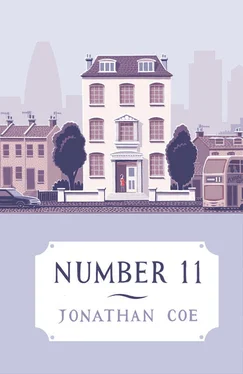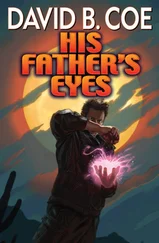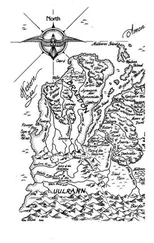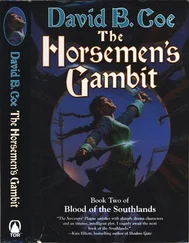Alison’s eyes met mine. I saw at that moment something I had not suspected before: she was as apprehensive as I was. But she was also, at heart, much braver: and without any more dithering she now marched boldly up the steps, grasped the heavy iron knocker (in the shape of some contorted gargoyle) and let it fall three times against the door’s thick oak panelling.
There was a long pause: long enough to allow me the luxury of some sweet relief, a few moments’ precious hope that the knock would not be answered at all. But finally we heard shuffling footsteps behind the door; and then it was pulled open.
Already dark with suspicion, the Mad Bird Woman’s face hardened still further when she saw us.
‘You! What do you want?’
‘Please, miss,’ said Alison, ‘we’ve got something that belongs to you, and we’ve come to give it back.’
I looked at her full of new admiration: her tone struck just the right balance between insolence and wheedling politeness. She held up the spider card and, as soon as she saw it, the Mad Bird Woman reached out a demanding hand.
‘Ah, yes. We were wondering where that one had got to. Come on, pass it over.’
But Alison kept the card back. ‘Please, miss, we’ve walked all the way across from the other side of town to bring you this, and now we’re thirsty. Can we have something to drink, please?’
The Woman’s eyes narrowed at the audacity of the question. She licked the studs on her lower lip, thought for a few seconds, and said: ‘All right. Come in.’
We squeezed past her into a hallway which was gloomy enough already, but was plunged into even greater blackness when she promptly slammed the door behind us. Now she was just a shadow, a mannish bulk looming indistinct against the dun-brown background of the wall. We had all become shadows.
‘I’ll get you some water,’ she said.
‘I’d rather have a cup of tea, please,’ said Alison. ‘With milk and two sugars.’
The Woman gave an incredulous grunt, and said, ‘Would you now?’ But she threw open a door, all the same, and held it wide for us. ‘In here, then.’
We stepped into a room which was slightly — but not significantly — brighter than the hallway we had just left behind. Most of the noonday sunlight was held at bay by the thick screen of ivy which covered much of the window, in the midst of which a couple of dozen birds were hopping and nesting and looking in at us with bright eyes and curiously inclined heads. This was the same front room we had peered into the day before. It was dominated by a long, narrow dining table in dark wood, with massive wrought-iron candlesticks at either end; and by a large, murky oil painting, half abstract and half landscape, which took up most of the wall opposite the windows. The walls must once have been white, I supposed, although now they were closer to grey. Cobwebs sprouted from every corner and dangled down from the flaking cornices. It was a singularly cold and cheerless room.
‘Are you going to give me that?’ the Woman asked again, holding out her hand.
‘Tea first — card later,’ said Alison, in a defiantly sing-song tone. The Woman glowered at her and left the room, closing the door behind her with a firm slam.
I rushed to the door and tried the handle, fruitlessly.
‘Now look what you’ve done,’ I wailed. ‘We’re trapped! She’s locked us in!’
Alison strolled over and opened the door in a relaxed and easy movement.
‘Calm down, can’t you? You were turning the handle the wrong way. We can leave any time we want.’
‘Then let’s leave now ,’ I said. ‘She doesn’t want us here. She looked like she was going to murder us. Did you see those … things all over her face? And those tattoos!’
‘Lots of people have tattoos,’ said Alison. ‘And if she didn’t want us here, she wouldn’t have offered us tea.’ Now she wandered over to a second painting, a smaller one, some sort of still life, which hung next to the door. ‘What do you make of this?’ she said.
‘For heaven’s sake. We’re not here to look at paintings. What did you want to come inside for? Why couldn’t we just have given her the card and gone home?’
‘Because that wasn’t what we came for. Now look — when she comes back, I’ll slip out and go down to look in the cellar, so you’ll have to keep her talking.’
I was horrified. ‘What? I can’t keep her talking.’
‘All right, then — I’ll keep her talking, and you go down to the cellar.’
‘No! I can’t go down to the cellar either.’
‘Well, there are only two of us. You’ve got to do one or the other. Is that meant to be a tennis racket, do you think? And what about this? It looks like a football.’
I tugged her away from the painting, maddened by the insouciance with which she now seemed to be accepting this desperate situation. I was convinced that we were never going to get out of this house alive.
‘By the way,’ Alison added, ‘did you notice what she said?’
‘When?’
‘Back on the doorstep, when I showed her the card. She said, “We were wondering where that one had got to.” Not I was wondering. We .’
She gave me an emphatic, meaningful nod, seeming happy at this apparent confirmation of her theories. As for me, this further proof — if proof it was — of the Bird Woman’s madness sent my heart plummeting even further. The thought of being alone in the room with her made me want to be sick. In fact, I couldn’t do it: there was simply no way. I was going to have to choose what now seemed (incredibly) to be the lesser of two evils.
‘Look, Ali — I’ll go down to the cellar. You stay here and keep her talking.’
‘Are you sure?’
I nodded miserably, and just then the door was opened again and our terrifying host reversed into the room, carrying with her a tea tray rather than an axe or a carving knife. This was some consolation, I suppose, although it still left open the possibility that she intended to poison us.
‘Here you are, then,’ she said. ‘Two nice mugs of tea.’ She put the tray down on the table and then swirled the teapot around a few times before starting to pour. ‘Aha!’ (She noticed that Alison had wandered over to the larger of the two paintings.) ‘Admiring my artwork, are you?’
‘Did you paint this?’ Alison asked, evidently impressed.
‘All the paintings in this house are mine.’
‘Cool. So where is this?’
Still carrying the teapot, the Woman came over to stand beside Alison and look more closely at the canvas. Despite everything, my gaze was drawn towards it too. Now that I looked at it properly I could see that it showed a bleak swathe of moorland, beneath a stormy and cloud-covered sky rendered in such brutal strokes that it appeared at first to be a mere chaos of grey and black shades.
‘North Yorkshire,’ said the Woman. ‘You see this house?’
She laid her finger upon a patch of canvas. Perched almost on the crest of a vast, forbidding ridge, overlooking a large expanse of dismal and featureless water, was a gaunt mansion rendered in the blackest of blacks. It took up very little of the painting, but somehow seemed to dominate it: a mad conglomeration of gothic, neo-gothic, sub-gothic and pseudo-gothic towers which collectively resembled nothing so much as a giant hand, snatching at the clouds as if in the conviction that, despite their vaporous insubstantiality, they could be pilfered from the sky itself.
In the bottom right-hand corner of the picture, two words had been written: ‘Winshaw Towers’. They were followed by the initials ‘P. B.’ and the date ‘1991’.
‘That’s a real house,’ the Woman continued, ‘where I used to work for a while. As a nurse. Until one night, twelve years ago …’
Читать дальше












